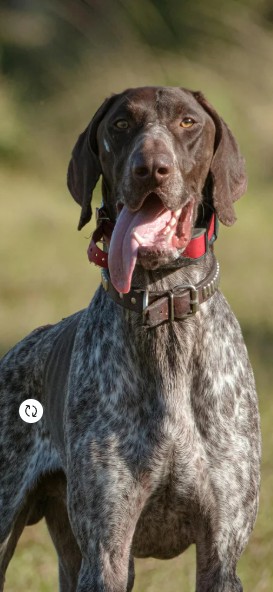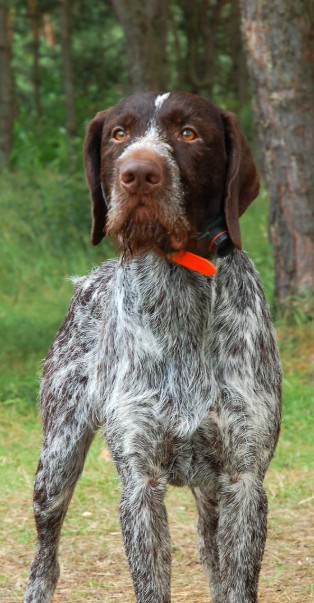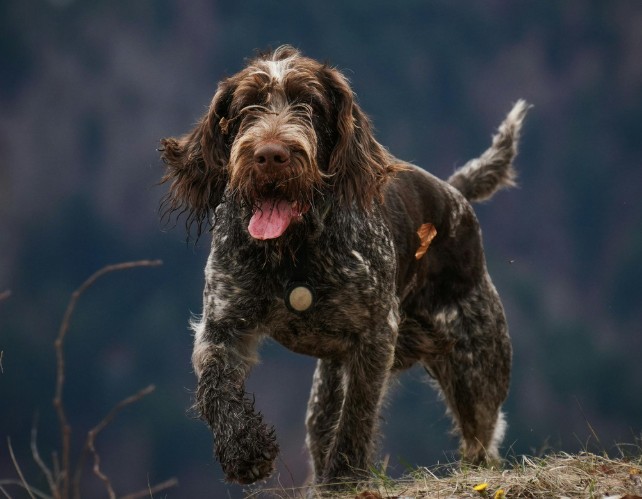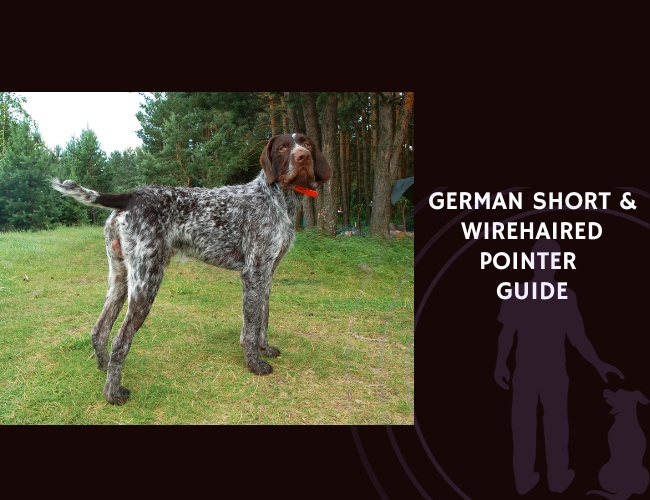Introduction to German Pointers
The German Shorthaired Pointer & German Wirehaired Pointer: An Overview
If you’re looking for a dog that’s athletic, loyal, and adaptable, German Pointers—specifically the German Shorthaired Pointer (GSP) and German Wirehaired Pointer (GWP)—have likely caught your attention. Both breeds were developed as versatile hunting dogs, excelling in pointing, tracking, and retrieving upland game and waterfowl. Their shared hunting heritage shines through in their energy, intelligence, and dedication to work.
Historical Development and Breed Purpose
German Pointers have roots dating back to 19th century Germany, where hunters required dogs that could perform a variety of tasks across different terrains. The GSP was designed for speed, versatility in the field, and ease of transition between land and water. Its smooth, short coat made it ideal for quick movement and all-weather resilience.
The GWP emerged a bit later, built for harsher conditions and denser cover. Hunters wanted a dog that was just as versatile but added extra protection with a dense, wiry coat. This allowed the GWP to resist thorns, wet weather, and cold, making it an all-season companion in the toughest environments.
Breed Characteristics and Shared Heritage
Both breeds are highly energetic and mentally intense. They thrive on challenging tasks and do best with daily outlets for their stamina and drive. These dogs are eager to please, bond closely with their families, and display both strong scent-tracking and retrieving instincts.
While their shared ancestry created many similarities, each breed has distinct features:
- GSPs are known for their smoother temperaments, adaptability with new people, and ease of integration into a variety of social situations.
- GWPs are generally a bit more reserved and watchful, with a reputation for being more territorial, thanks in part to their role protecting property as well as hunting.
Above all, both the GSP and GWP represent the German tradition of breeding dogs who are not only talented hunters but also loving, active companions.
As you consider life with a German Pointer, understanding their energy and personality forms the foundation for a happy and healthy partnership.
Character & Behaviour
High Energy and Mental Drive
German Shorthaired Pointers (GSPs) and German Wirehaired Pointers (GWPs) have a reputation for being energetic and highly driven dogs. Both breeds were originally developed as versatile hunting companions, which explains their boundless physical and mental stamina. They need long, daily exercise sessions—over 90 to 120 minutes—to stay happy and healthy. Without enough activity, these dogs can develop behaviors such as restlessness, barking, or even destructiveness. Their strong work ethic means they thrive on having a job to do, whether that’s retrieving, running, or practicing scent work.
Distinct Temperament Traits
Though GSPs and GWPs share strong motivation and endurance, their personalities have unique shades:
- GSPs tend to be smoother in social settings. They are generally welcoming with new people and other dogs, showing great flexibility in various environments.
- GWPs often show more wariness or territorial behavior, especially with strangers. They can still be loving and loyal, but may prefer the familiar company of their family unit.
Both breeds are intelligent and learn quickly, and both form deep bonds with their families. However, GWPs’ greater vigilance means they benefit from early and consistent socialization to help them feel comfortable in different situations.
Task Focus and Prey Drive
As hunting dogs, GSPs and GWPs have strong natural instincts. Their high prey drive and environmental alertness should not be underestimated. These dogs often notice every movement, sound, and scent in their environment. They are dedicated trackers and have persistent, scent-driven behavior, which is a huge asset for field work but requires secure fences and thoughtful management at home.
Without enough daily exercise and mental stimulation, both breeds can quickly become bored. Giving them regular outlets for their energy and instincts—such as field games or scent puzzles—helps channel their behaviors in positive ways.
We understand that you want a companion who is eager, intelligent, and fun-loving. With the right environment and attention, both GSPs and GWPs can thrive as dedicated, loyal members of your family.
Next, you’ll discover how thoughtful training can foster their natural abilities and set your German pointer up for success.
Training & Education
Early Socialization and Environmental Exposure
Training your German Shorthaired Pointer (GSP) or German Wirehaired Pointer (GWP) starts early and is essential for a well-mannered companion. Both breeds are born with strong hunting instincts and mental intensity, which means early positive experiences with new people, animals, sights, and sounds will set the stage for a confident adult. Without structured socialization during puppyhood, GSPs may become hyperactive or restless, while GWPs—due to their natural wariness—could develop territorial or reactive behaviors if not exposed to a variety of situations in a reassuring way. We understand that you want your dog to feel safe and adaptable, and taking them on gentle adventures, family outings, and supervised play dates can do wonders for their comfort with the world.
Effective Training Methods
Due to their intelligence and energy, both GSPs and GWPs thrive with clear, consistent training. Positive reinforcement—offering treats, praise, or toys for desired actions—works well and helps build a trusting relationship. Structured activities like agility, fieldwork, or scent games offer both physical and mental rewards. It’s important to create a balance: alternate between exciting, high-energy games and calming exercises like “down-stay” or walking on a leash. This not only channels their enthusiasm but teaches impulse control—preventing frustration and boredom that could lead to unwanted behaviors like barking or destructiveness.
Breed-Specific Considerations
GSPs are generally more socially adaptable and may respond quickly to training cues. GWPs, however, are often a bit more independent and reserved. For GWPs, firm and clear boundaries from an early age are key. This does not mean harsh discipline—just extra structure and consistency, so your GWP knows exactly what to expect. If you’re patient and maintain routines, both breeds will impress you with their work ethic and eagerness to please. Keep sessions short, varied, and rewarding; overcorrection or insufficient stimulation can lead to a shutdown or frustration in these sensitive dogs.
Offering consistent guidance will help unlock your pointer’s potential, setting them up for a healthy and active lifestyle as both a working partner and a family member.

Nutritional Requirements
Essential Nutritional Balance
German Shorthaired Pointers (GSPs) and German Wirehaired Pointers (GWPs) need a diet that helps them stay athletic and full of energy. Both breeds thrive on high-protein, moderate-fat diets. Protein supports lean muscle mass, while healthy fats provide sustained energy for their active routines. Adults generally do well on food containing about 20% protein and 10% fat. Puppies, still growing and developing, benefit from higher levels of both. Remember, each dog is unique, so it’s always important to tailor amounts for age, body condition, and health.
Calorie Needs and Seasonal Adjustments
A GSP or GWP’s caloric needs can change throughout the year. During hunting or training seasons, their energy output increases, so their portion sizes may need to go up. When dogs are less active—perhaps in winter or during rest periods—calories should be reduced to prevent weight gain. We understand that you want your dog to be energetic but not overweight, so regular monitoring of body condition and activity is key. Always provide fresh water, especially after exercise or on hot days, to help with hydration and health.
Digestibility and Special Support
Highly active dogs sometimes have sensitive stomachs. They benefit from foods that are easy to digest and contain prebiotics for gut health. This helps them absorb all the energy and nutrients they need while minimizing stomach upsets. If your GSP or GWP is working hard, consider foods designed for high digestibility.
Joint Care for Active Dogs
Both breeds are at higher risk for joint issues throughout life due to their high activity levels. Including joint-protective nutrients like glucosamine and chondroitin is wise. These can help support flexibility and mobility, keeping your dog happier and moving well into old age. For dogs already showing signs of stiffness, it’s always best to consult your veterinarian.
Nutrition is a cornerstone of a pointer’s healthy life and performance. With the right feeding plan, your energetic companion is set up for daily adventures and long-term well-being.
Health Concerns & Hereditary Risks
Common Disorders
Both German Shorthaired Pointers (GSPs) and German Wirehaired Pointers (GWPs) are usually vigorous, active dogs. Still, they share a tendency for a few notable health concerns. Most significantly, both breeds are prone to hip and elbow dysplasia. These are hereditary joint disorders which can lead to discomfort, mobility challenges, and arthritis. Responsible breeders screen for these issues, but even with good breeding, it’s important for owners to watch for signs such as stiffness after exercise or reluctance to jump and run.
Von Willebrand’s Disease is another hereditary risk in both breeds. This disorder affects blood clotting. While not as common as hip issues, it can cause unexpected bleeding. Genetic testing is available and recommended for breeding dogs.
Other health risks include entropion—where eyelids roll inward—and hypothyroidism, both of which are seen in GSPs and GWPs.
Breed-Specific Vulnerabilities
GWPs have a distinct genetic vulnerability: their dense, wiry coats can lead to a higher rate of skin disorders. Owners may notice frequent skin irritations, hot spots, or allergies. Their hairy ears also hold moisture, making GWPs more prone to ear infections. Regular grooming and prompt attention to any scratching or redness are key preventive steps.
Gastric Dilatation-Volvulus (Bloat)
Due to their deep chests, both GSPs and GWPs have an increased risk for Gastric Dilatation-Volvulus, often called bloat. This life-threatening condition involves the stomach twisting and filling with gas. Symptoms include a swollen abdomen, pacing, and non-productive retching. Risk can be lowered by feeding several small meals a day, discouraging rapid eating, and avoiding vigorous exercise right after eating.
Prevention and Care Tips
Keeping these athletic dogs healthy takes vigilance and proactive care:
- Keep up with regular vet check-ups and screenings
- Provide joint-support supplements like glucosamine and chondroitin as recommended
- Brush GWPs’ coats and clean their ears often to prevent infections
- Watch for signs of pain, discomfort, or unusual bleeding
With attentive care, you’ll help your German Pointer enjoy many happy, active years. Daily routines and preventive habits go a long way, setting your companion up for a thriving, healthy future.
Driven. Loyal. Limitless.
Built for purpose.
They don’t run for fun. They run for meaning. German Pointers move like they were born to follow a mission—and they were. Their drive isn’t random. It’s centuries of instinct, muscle, and intent.
Partners, not followers.
These dogs don’t beg for attention—they earn your respect and expect clarity in return. They want to work with you, not for you. Give them a task, and they’ll give you everything.




Loyalty begins with trust.
This isn’t a breed you command—it’s a soul you guide. When bonded right, they won’t just obey. They’ll watch your every move like it matters—because to them, it does.
Exercise & Environmental Needs
Daily Activity Requirements
German Shorthaired Pointers (GSPs) and German Wirehaired Pointers (GWPs) are famous for their vibrant energy and drive. These breeds need more than 90-120 minutes of daily exercise. Just a stroll around the block is not enough. Instead, their routines should include:
- Aerobic exercise, such as running or swimming
- Games that use their noses, like scent work or hide-and-seek
- Structured activities, such as retrieving, agility, or basic fieldwork
Mixing physical and mental activities helps keep them satisfied and prevents restlessness. Without enough stimulation, both breeds may show signs of frustration—think hyperactivity, chewing furniture, or non-stop barking. Setting up a daily schedule makes it easier to meet their needs and avoid problem behaviors.
Ideal Living Setups
While GSPs and GWPs can adapt to family life, they are best suited for homes with plenty of space. The ideal setting is rural or semi-rural, where they have room to run and explore safely off-leash. Large, secure yards or regular access to off-leash parks make a big difference. Apartment life is only an option if owners are highly dedicated to exercise and engagement.
Safety is important due to these breeds’ high prey drive and alertness. Fences should be tall and secure—some individuals can jump impressively high! Always supervise outdoor time in new environments.
Preventing Behavioral Issues
We understand that you want a happy and well-behaved companion. The key is proactive management:
- Schedule at least two exercise sessions each day
- Rotate toys and change up routine to keep things interesting
- Incorporate training games to challenge their minds
- Provide opportunities for off-leash play in safe, enclosed areas
- Watch for early signs of boredom like digging or barking
Lack of exercise and stimulation is a leading cause of behavioral challenges in these breeds. With the right outlets, GSPs and GWPs are joyful, focused, and a pleasure to live with.
Building strong routines for exercise now will set you up for success as you continue your journey in caring for these dedicated canine athletes.

Grooming & Maintenance
Coat Differences and Care Needs
German Shorthaired Pointers (GSPs) and German Wirehaired Pointers (GWPs) both have coats that offer protection in the field, but their grooming needs are not the same. GSPs sport a short, smooth coat that sheds in moderate amounts. This coat is easy to manage—brushing once or twice per week using a rubber curry or bristle brush keeps it healthy and removes loose hair.
On the other hand, GWPs have a dense, wiry coat with a softer undercoat. This special coat is designed to protect them from brambles and harsh weather but needs more frequent attention. Dirt, burrs, and debris can get trapped easily. GWPs should be brushed at least three times per week, using a slicker brush or a metal comb to prevent matting and to keep their coats free of tangles. Occasional professional hand-stripping helps maintain the wiry texture and avoid skin problems.
Brushing Techniques and Grooming Tools
Regular grooming not only keeps both breeds looking their best, it also supports their health. For GSPs, brushing removes dirt before it becomes a problem and helps distribute natural oils. Brushing GWPs often is essential for preventing mats and reducing the chance of skin irritation.
- Tools for GSPs:
- Rubber curry brush
- Soft bristle brush
- Tools for GWPs:
- Slicker brush
- Metal comb
- Professional hand-stripping tools
Besides brushing, pay attention to ears, which can trap moisture and debris—especially in GWPs. Clean ears regularly to prevent infections.
Seasonal Shedding and Professional Help
Both GSPs and GWPs tend to shed more heavily in the spring and fall. During these periods, more frequent brushing is helpful to manage extra hair and keep the coat in good condition. Bathing should remain occasional (every few months) unless the dog gets particularly dirty.
For GWPs, consider professional grooming a few times per year to help remove dead hair and check for any underlying skin issues. GWPs’ unique coats benefit from this extra care, supporting their skin health and appearance.
Routine coat care sets these energetic companions up for a comfortable life, helping them stay focused on adventure and time with their families.
Family Compatibility & Lifestyle Considerations
Adaptability in the Family Home
German Shorthaired Pointers (GSPs) and German Wirehaired Pointers (GWPs) can both thrive in active family environments when their high energy needs are met. While their natural instincts make them wonderful partners for outdoor enthusiasts, these breeds also appreciate time indoors when mentally and physically satisfied. However, their adaptability comes with the need for structured exercise and mental stimulation. Homes with children or other pets should focus on early socialization, ensuring positive interactions from a young age for smooth integration.
Bonding Patterns and Separation Anxiety
These pointers form close bonds with their human companions, especially their primary handlers. GSPs are often described as “velcro dogs,” shadowing their person from room to room and seeking affection throughout the day. GWPs may show the same loyalty but sometimes with a more reserved approach, displaying devotion through alertness and protective behaviors. It’s important to recognize that both breeds are prone to separation anxiety if left alone for long periods. Providing engaging toys, puzzle feeders, or arranging for dog daycare can help minimize stress when the family is away.
Suitability for Various Households
Not all households are equally suited for German pointers. Here’s what to consider:
- Active Families: These breeds are happiest in homes where daily exercise (at least 90-120 minutes) is part of the family routine. Jogging, hiking, agility, or scent games make excellent outlets.
- Space Requirements: Ideal environments are rural or suburban homes with large, secure yards. Urban apartments can work only if owners are dedicated to off-site exercise.
- With Other Pets: Early, positive experiences with other pets usually result in good relationships. However, their prey drive may not be ideal for homes with smaller animals.
- Households with Young Children: Both breeds can be gentle with kids, but supervision is essential, especially as these dogs can be exuberant and energetic.
We understand that every family’s lifestyle is unique. With commitment to exercise, positive routines, and affection, both GSPs and GWPs reward their owners with loyalty, enthusiasm, and love, making them valued family members.
Next, we’ll help you compare these breeds more directly, so you can make an informed decision matched to your household’s needs.
Choosing Between GSP & GWP
Comparing Key Differences
When selecting between a German Shorthaired Pointer (GSP) and a German Wirehaired Pointer (GWP), it’s important to consider what truly fits your lifestyle and household. Both breeds share roots as versatile hunting dogs, making them energetic, active companions. Their most significant difference is in temperament and maintenance.
- GSPs are often more adaptable and sociable, easily mingling with different people and pets. They’re known for being “velcro dogs” that bond very closely with their families.
- GWPs, on the other hand, tend to be a bit more reserved and territorial. They can be wary of strangers and might need more intentional socialization, especially in busy households.
Another practical consideration is grooming:
- GSPs have a short, smooth coat that’s easy to maintain with weekly brushing.
- GWPs’ signature wiry coat requires more frequent brushing and periodic professional grooming to prevent matting and manage shedding.
Lifestyle Compatibility Factors
We understand that you want a dog that harmonizes with your routines and energy. These pointers thrive in active lifestyles centered on daily exercise of at least 90-120 minutes.
- Rural or semi-rural settings with ample space are ideal, but with dedication, the breeds can also adapt to suburbia or city life if exercise needs are met.
- Both breeds form strong bonds and may be prone to separation anxiety, so consistent companionship and structured activity are essential.
- If you often travel, work long hours, or live in a small apartment without outdoor access, these breeds may not be your best match.
Commitment and Lifespan
Bringing a GSP or GWP into your life is a long-term commitment. Both breeds generally live 12-14 years, so it’s vital to consider their needs at every stage.
- Regular veterinary care, joint supplements, and preventive health routines will help them stay healthy for years to come.
- Commitment to exercise, training, and grooming is not just a chore—it’s the foundation for a happy, balanced companion.
Taking time to reflect on these factors helps ensure that your decision is informed and considerate—an approach that rewards you with a loyal friend ready for all of life’s adventures.
Conclusion & Resources
Essential Care Summary
We understand that you want the best for your dog, so let’s recap the essentials for both German Shorthaired Pointers (GSPs) and German Wirehaired Pointers (GWPs). Both breeds are spirited, intelligent, and thrive in active environments. They need daily exercise—aim for 90-120 minutes each day. This commitment can include walks, runs, mental enrichment, and scent-related games.
Feeding is just as important. Offer high-protein, moderate-fat diets and adjust portions based on your dog’s activity and the season. Always ensure your pets have fresh water available. Keeping them healthy also means regular vet visits, early screening for joint issues, and being mindful of breed-specific risks like skin disorders or ear infections in GWPs, and bloat in both breeds.
Grooming habits differ slightly: GSPs do well with weekly brushing, but GWPs need more frequent coat care. Both benefit from ear checks and occasional professional grooming for optimal skin and coat health.
Tips for Responsible Ownership
Welcoming a GSP or GWP into your life is a long-term promise. Both breeds form strong bonds and may suffer separation anxiety, so spend quality time together and provide consistent routines. Make sure your home—ideally with a safe, open yard—gives them space to move and play. Consistency in training and socialization sets your pointer up for lifelong confidence and obedience.
Further Education and Support
For anyone wanting to deepen their understanding, breed clubs and dedicated guides are invaluable. They offer insights on training techniques, troubleshooting behavior, and community connections. Whether you’re a new owner or a seasoned handler, engaging with other enthusiasts can enhance your pointer’s life and your enjoyment as a guardian.
Owning a German Pointer brings years of joy, loyalty, and adventure. With care, patience, and plenty of exercise, these remarkable companions will enrich your days and thrive by your side.










